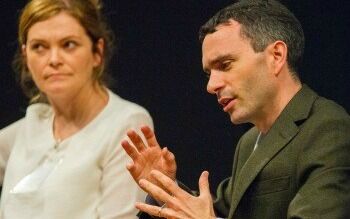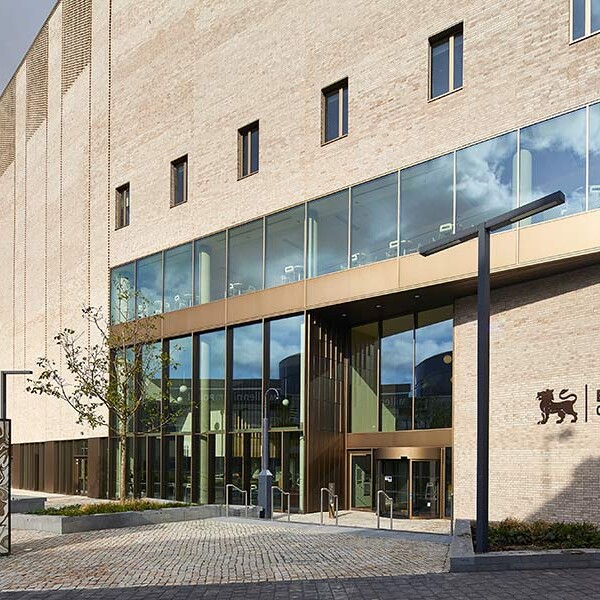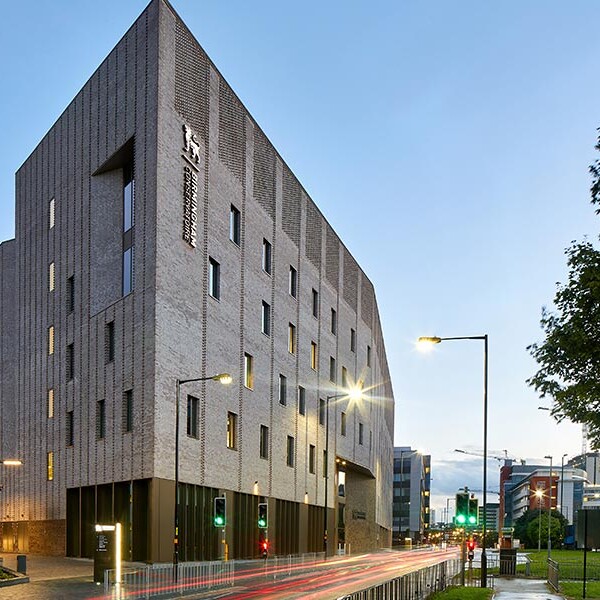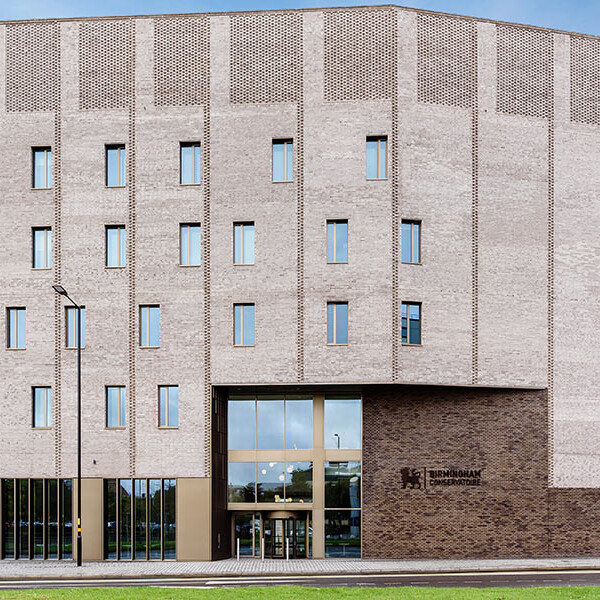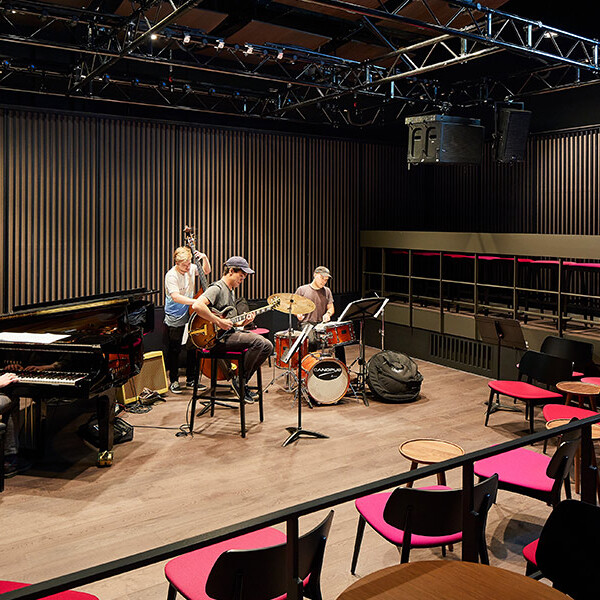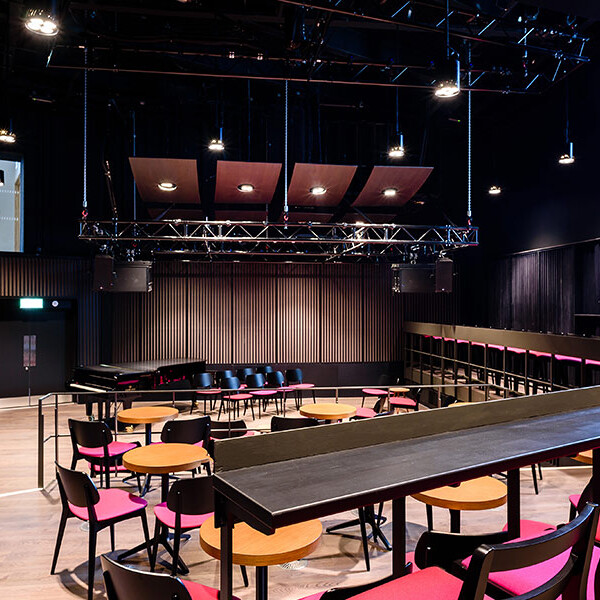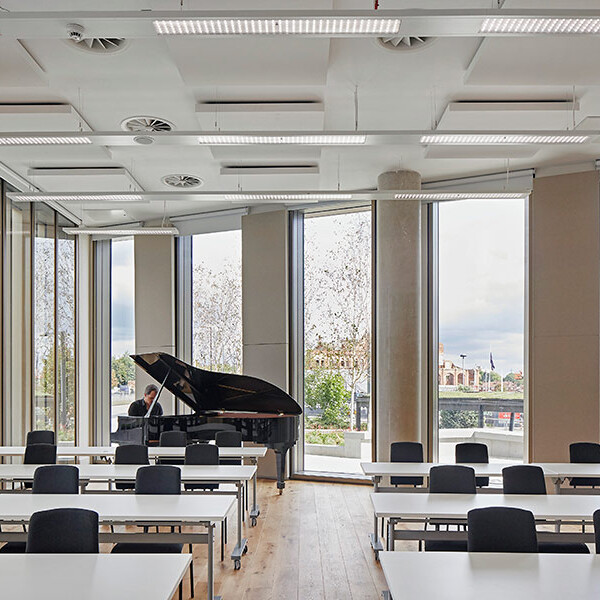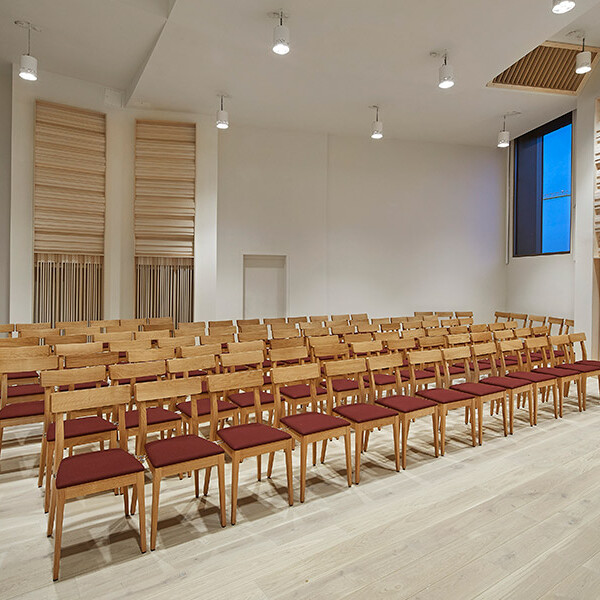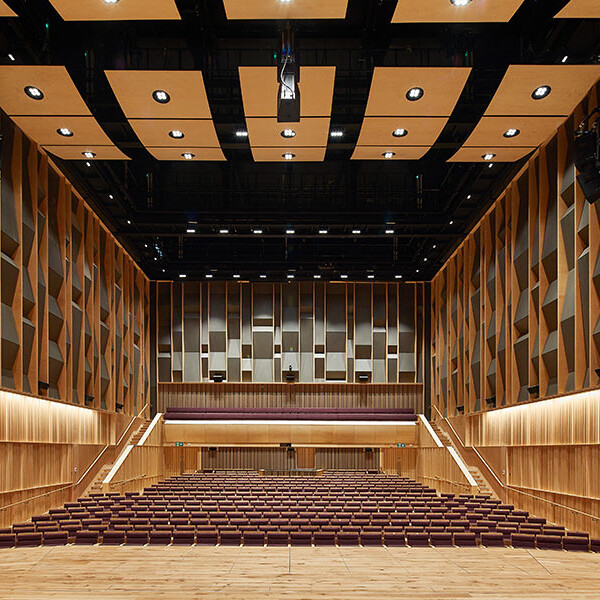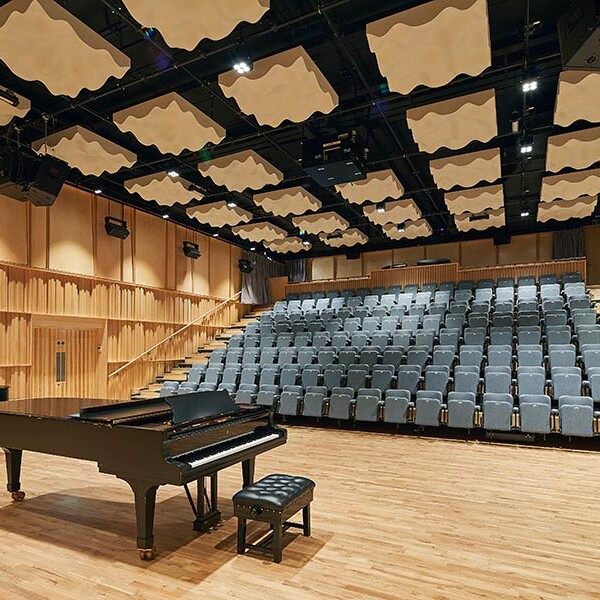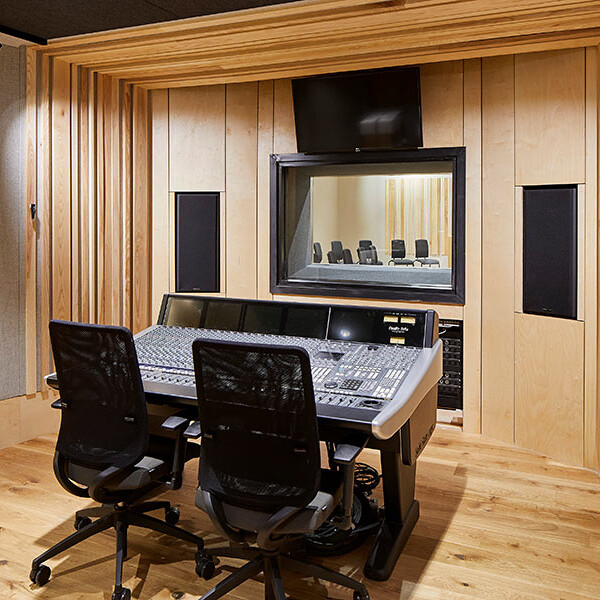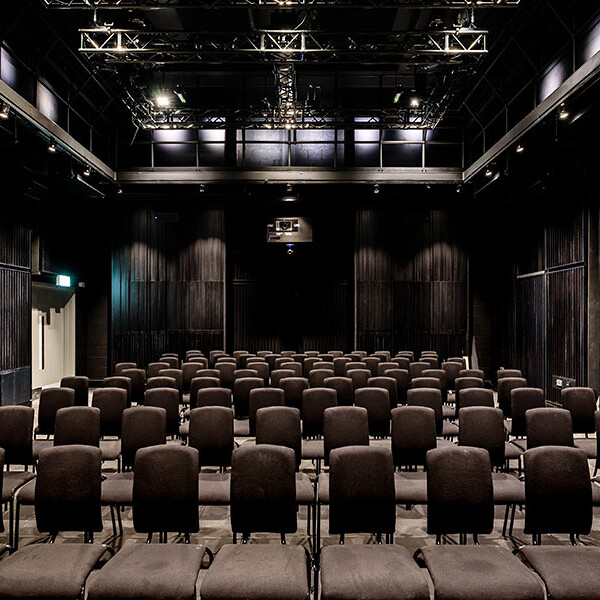
Jazz - BMus
Currently viewing course to start in 2025/26 Entry.
The launch of our Eastside Jazz Club has helped consolidate the integral role that Royal Birmingham Conservatoire has to play in a major UK city that enjoys a thriving jazz scene. While Birmingham’s jazz scene has been established over many years, our bespoke venue promises an exciting future for Jazz in the city....
- Level Undergraduate
- Study mode Full Time
- Award BMus
- Start date September 2025
- Fees View course fees
- Subject
- Location Royal Birmingham Conservatoire
This course is:
Open to International Students
Overview
The launch of our Eastside Jazz Club has helped consolidate the integral role that Royal Birmingham Conservatoire has to play in a major UK city that enjoys a thriving jazz scene. While Birmingham’s jazz scene has been established over many years, our bespoke venue promises an exciting future for Jazz in the city.
Our Jazz Department is based around the Club, where student musicians share a platform and get invaluable side-by-side performance experience with the best on the scene, whom we welcome to our stage on a regular basis.
This course meets with the needs of the modern jazz performer – it places emphasis on practical work, with the majority of time dedicated to one-to-one lessons, small group coaching and private practice. You'll study modules that have been specifically and skilfully designed for jazz musicians, and as part of your learning we encourage you to explore in depth the relationship between improvisation and composition, which is central to developing your individual voice. You will graduate as a versatile, professional musician who is knowledgeable about the entrepreneurial opportunities available to you, and aware of the commercial realities for musicians joining today’s UK jazz scene as a portfolio musician.
Delivered by performers, band leaders and composers who enhance their teaching with professional experience, insights and connections, the course hones both your performance and professional awareness.
With individual specialist tuition throughout all four years of the course you will get the individual attention you need to prepare for a successful career in the music profession.
As well as having our own club that has taken its place on Birmingham’s vibrant jazz scene, our students enjoy professional experience opportunities with external gigs that familiarise them with the industry – for example through our partnership with Cheltenham Jazz Festival – one of many ways we prepare you for the future.
What's covered in this course?
The BMus (Hons) Jazz course is a specialist course for performers in jazz. Its main aim is to prepare students for a career in the music profession in the field of jazz. At the heart of our course's philosophy is the ideal of the informed musician; someone who is able to combine both advanced skills and musical knowledge in the advancement of their musical career. The BMus (Hons) Jazz course therefore aims to develop the specialist skills, the theoretical, historical and practice-based knowledge and to encourage the individual creativity required for you to become an independent learner, a critical thinker and a reflective practitioner.
You will be taught by performers, band leaders and composers, who are ideally placed to share their professional experience, insights and connections. With their guidance, you will hone both your performance skills and your professional awareness.
My musical approach is greatly indebted to the time I spent studying on the jazz course. Simply being around like-minded people in a culture of practice and study, with guidance from musicians I greatly respected, was extremely beneficial.
Tom Chapman
Why Choose Us?
- Top 15 in the UK for Music (Guardian League Table 2025).
- You will work with some of the greatest musicians and study on modules that have been specifically and skilfully designed for jazz musicians.
- Our performance health programme — including performance coaching, physiotherapy, movement workshops and Alexander technique classes — allows students to develop as confident and effective performers.
- You will experience significantly more one-to-one tuition time than on a typical academic university music course – or indeed any other conservatoire courses.
- We are proud to be a festival partner of the Cheltenham Jazz Festival; a partnership that gives our students an insight into how festivals are run, and some invaluable performance opportunities.
- We are the only Conservatoire who run a Jazz Club venue as an integral part of the courses. Our very own Eastside Jazz Club boasts a roll call of artists to rival any jazz club in Europe and beyond.
- Our course prepares you for a portfolio career on the contemporary music scene, with performance at its core. It will also give you transferrable skills, including team-working, adaptability, self-promotion, time management and critical thinking.
- You will have full access to our superb £57 million facilities. These include our wonderful performance spaces: the 500-seat Bradshaw Concert Hall, the 150-seat Recital Hall, our black-box performance space known as “The Lab”, the Organ Studio, and our fabulous Eastside Jazz Club. We’ve not even mentioned our seven recording studios and more than 70 practice rooms, ensemble rooms and workshops in addition; all acoustically designed to provide a music-making environment that is absolutely world-class.
- We have countless partnerships and long-established professional relationships with organisations including the Cheltenham Jazz Festival, City of Birmingham Symphony Orchestra, the Welsh National Opera, Birmingham Royal Ballet, Orchestra of the Swan and the Royal Shakespeare Company.
Open Day
Join us on campus where you'll be able to explore our facilities and accommodation in person, and chat to staff and students from the Royal Birmingham Conservatoire.
Next Open Day: 12 June 2025
Entry Requirements
These entry requirements apply for entry in 2025/26.
All required qualifications/grades must have been achieved and evidenced at the earliest opportunity after accepting an offer to help confirm admission and allow for on-time enrolment. This can also include other requirements, like a fee status form and relevant documents. Applicants can track their application and outstanding information requests through their BCU mySRS account.
Essential requirements
32 UCAS Tariff points. Learn more about UCAS Tariff points.
Applicants will also need to complete an audition for this course; see audition arrangements below.
If you have a qualification that is not listed, please contact us.
Fees & How to Apply
UK students
Annual and modular tuition fees shown are applicable to the first year of study. The University reserves the right to increase fees for subsequent years of study in line with increases in inflation (capped at 5%) or to reflect changes in Government funding policies or changes agreed by Parliament. View fees for continuing students.
Award: BMus
Starting: Sep 2025
- Mode
- Duration
- Fees
- Full Time
- 4 years
- £9,535 in 2025/26 ✱ Important note for this price
- Apply via UCAS
(↩Back to price) * The Government is proposing to increase the cap on full-time regulated tuition fees to £9,535 for 2025/26 and the University is planning on increasing fees to that maximum level once legislation is enacted. Part-time fees are charged pro-rata, where applicable.
International students
Annual and modular tuition fees shown are applicable to the first year of study. The University reserves the right to increase fees for subsequent years of study in line with increases in inflation (capped at 5%) or to reflect changes in Government funding policies or changes agreed by Parliament. View fees for continuing students.
Award: BMus
Starting: Sep 2025
- Mode
- Duration
- Fees
- Full Time
- 4 years
- £27,500 in 2025/26
- Apply via UCAS
Applications are still open for September 2025. Apply now
Guidance for UK students
UK students applying for most undergraduate degree courses in the UK will need to apply through UCAS.
The Universities and Colleges Admissions Service (UCAS) is a UK organisation responsible for managing applications to university and college.
Applying through UCAS
- Register with UCAS
- Login to UCAS and complete your details
- Select your course and write a personal statement
- Get a reference
- Pay your application fee and submit your application
Personal statement
UK / EU students are required to submit a personal statement as part of their application for this course.*
The personal statement gives you a crucial opportunity to say why you’re applying and why the institution should accept you.
Here are the key areas you’ll need to address:
- Course choice - Why does this course appeal? What areas are of particular interest?
- Career plans - If you have a specific career in mind, say how your chosen course will help you pursue this goal.
- Work experience - Mention any work that is relevant to your subject, highlighting the skills and experience gained.
- School or college experience - Highlight skills gained at school/college, eg summer schools or mentoring activities.
- Non-accredited skills or achievement - eg Duke of Edinburgh Award, Young Enterprise scheme.
You should also mention your future plans – if you’re planning to take a year out, don't forget to give your reasons. Talk about any subjects you’re studying that don’t have a formal assessment and any sponsorships or placements you’ve applied for. And don't be scared to add in details about your social, sports or leisure interests.
Worried about Personal Statements?
If you've got no idea where to start or just want to check you're on the right track, we’ve got expert advice and real examples from our students to help you nail your personal statement. You can even download our ultimate personal statement guide for free.
*Non-EU students are not required to submit a personal statement when applying for this course.
Course in Depth
Year one
In order to complete this course a student must successfully complete all the following CORE modules (totalling 120 credits):
This module lies at the heart of the course and of the learning experience for students on the BMus (Hons) Jazz. It is the first of a suite of principal study modules taken across the four years of the course and as such, it is therefore the first stage in realizing course aims 1, 2 and 4 (Pursuing excellence; practice-led, knowledge applied; employability) in preparing musicians for the profession; nurturing their creativity as performers; and developing high standards of musicianship and technique.
The module provides students with the opportunity to explore and develop their creative musicianship in the context of performance, and technical skills in relation to the jazz aural tradition. To learn and develop as a performer, an aspiring jazz musician needs regular playing opportunities that provide a forum for group improvisation. They also need contact with a mentor to help develop techniques and improvisatory language and need inspiration through example by leading performers in the field (aim 1. Pursuing excellence). Essential to the culture and community of jazz music is the standard repertoire. This allows individual performers to share a common language with many other musicians and also provides a fundamental foundation in learning how to address forms (aim 2. Practice led, knowledge applied), elements that are addressed in preparing for the end-of year performance exam.
Students will have one-to-one tuition throughout the year, allocated to specific teachers and activities in negotiation with the Head of Department. This is complemented by departmental workshops and masterclasses on performance repertoire, where both the exposure to a range of repertoire and to the variety of approaches by a range of international practitioners contribute to course aim 5 (Internationalisation).
A central tenet of the programme philosophy is the development of informed jazz musicians equipped to enter the profession. This module recognises the need for jazz musicians to have a highly developed approach to creativity (aim 1: pursuing excellence) reinforced by a thorough grasp of musical techniques and theories which are realized in practice through composition and core associated skills as preparation for improvisation (aim 2: practice led, knowledge applied). In this module first year students have the opportunity to develop skills in composition, and to develop their harmonic knowledge through keyboard skills and ear training The nature of the small-band work promotes the development of personal and interpersonal skills with particular reference to the cooperative and collaborative environment of the music profession and encourages students to develop a view of jazz as an international discipline with important links to numerous world cultures (aim 4: employability; aim 5: internationalization)
In this module, students are introduced to a variety of compositional techniques and strategies and to key areas of jazz harmony through keyboard and aural work, designed to enable them to develop their improvisational language, compose melodic lines that work within the jazz vernacular, and to develop and refine skills and knowledge relevant to a career in the music profession.
A central tenet of the programme philosophy is the development of informed jazz musicians. This module contributes to this by providing an overview of the historical development of the music.
Students will employ listening skills and analytical skills to understand musical processes historically, socially and technically and to articulate their musical understanding in both written form and by aural examination.
This module contributes to the delivery of programme aims 1 and 2: pursuing excellence through a wider knowledge of jazz history and developing skills to employ knowledge-applied research, which will in turn inform the student’s own musical practice. With guidance from the lecturer, each student chooses their own topic for the essay, thus enabling students to develop as informed practitioners within their discipline, cultivating an appreciation of key historical concepts and analytical processes to enrich performance and composition. It also contributes to programme aim 5, internationalization, in exposing students to a range of research practices and musicological approaches that encourage a broad, global outlook, and to aim 4, employability, in the development of core research, writing and aural skills.
Within the modern profession, most musicians will spend a proportion of their time working in educational and community outreach contexts, presenting live music/composition workshops and/or interactive performances in settings away from the formal concert platform, in venues such as schools, hospitals, care homes, and rehabilitation centres. This module aims to give you a practical and theoretical introduction to the wide range of music activities taking place in community/education settings [aim 2: practice-led, knowledge-applied] and therefore represents an aspect of preparing you for the profession as well as guiding you in your career aspirations by familiarising you with this important area of potential employment [aim 4 employability]. The activities within the module include practical tuition in conducting, and participation in a range of workshops with different interdisciplinary focuses including world music, jazz, composition-based, therapeutic, voice-led, and instrument-led [aim 3: interdisciplinarity]. This broad introduction to workshop facilitation strategies across different disciplines helps to promote an open-minded and enquiring attitude and enables you to build a ‘toolkit’ of workshop facilitation strategies, including musical warm ups, games, activities and communication techniques (musical, verbal, non-verbal), which will be useful for your future career. You will also critique video footage of professionals at work and reflect on your experiences during the module in order to inform a) a collaborative task where you will work with your peers to devise, deliver and engage your fellow students in a short interactive workshop; and b) your overall professional development [aim 1: pursuing excellence].
This module also continues to prepare musicians for the profession in respect of the personal and interpersonal skills required in the cooperative and collaborative environment of professional music making, and the qualities and attributes necessary for a career as a professional musician [aim 1, aim 4].
Year two
In order to complete this course a student must successfully complete all the following CORE modules (totalling 120 credits):
This module lies at the heart of the course and of the learning experience for students on the BMus (Hons) Jazz. It is the second of a suite of principal study modules taken across the four years of the course and as such, it is therefore the next stage in realizing course aims 1, 2 and 4 (Pursuing excellence; practice-led, knowledge applied; employability) in preparing musicians for the profession; nurturing their creativity as performers; and developing high standards of musicianship and technique.
The module provides students with the opportunity to explore and develop their creative musicianship in the context of performance, and technical skills in relation to the jazz aural tradition. To learn and develop as a performer, an aspiring jazz musician needs regular playing opportunities that provide a forum for group improvisation. They also need contact with a mentor to help develop techniques and improvisatory language and need inspiration through example by leading performers in the field (aim 1. Pursuing excellence). Essential to the culture and community of jazz music is the standard repertoire. This allows individual performers to share a common language with many other musicians and also provides a fundamental foundation in learning how to address forms (aim 2. Practice led, knowledge applied), elements that are addressed in preparing for the end-of year performance exam.
A central tenet of the course philosophy is the development of informed jazz musicians. This module recognises the need for jazz musicians to have a highly developed approach to creativity reinforced by a thorough grasp of musical techniques and theories which are realized in practice through composition and improvisation. In this module students have the opportunity to build upon the knowledge and skills gained in the Praxis 1 module and acquire further proficiencies in composition and improvisation which are essential for the aspiring jazz musician (aim 4: employability). The nature of the small-band work promotes the development of personal and interpersonal skills with particular reference to the cooperative and collaborative environment of the music profession and encourages students to develop a view of jazz as an international discipline with important links to numerous world cultures (aim 5: internationalization).
A central tenet of the course philosophy is the development of informed jazz musicians. This module contributes to this through the exploration and development of an in-depth knowledge of the key moments in the history of jazz. Students will employ listening skills and analytical skills to understand musical processes historically, socially and technically and to articulate their musical understanding and develop their own insights in both written form and through oral presentation.
This module contributes to the delivery of course aims 1 and 2: pursuing excellence through a wider knowledge of jazz history and developing skills to employ knowledge-applied research, which will in turn inform the student’s own musical practice. Alongside guidance from the lecturer, each student define their own specialist topic for the proposal and presentation, thus enabling them to develop as informed practitioners within their discipline, cultivating an appreciation of key historical concepts and analytical processes to enrich performance and composition. It also contributes to course aim 5, Internationalization, in exposing students to a range of research practices and musicological approaches that encourage a broad, global outlook, and to aim 4, Employability, in the development of core research, writing and presentation skills, including PowerPoint as required.
The course’s primary aim, central to its philosophy, is to equip students for a career in the music profession. Many Conservatoire graduates will teach as part of their professional life, and in the second year of the course you will study the pedagogical aspects of your principal-study discipline as an important aspect of preparing you for the profession. This will equip you with additional skills which are likely to prove useful in your future musical career [aim 4: employability]
Through devising and improvisation, the module also promotes an open and enquiring attitude to areas of music with which you may not already be familiar [aim 5: internationalisation]. This not only cultivates creativity for your performing and composing work: the materials and approaches used in the workshops contribute to a ‘toolkit’ of teaching strategies needed by successful educators in the 21st century [aim 2: practice-led, knowledge-applied].
Year three
In order to complete this course a student must successfully complete all the following CORE modules (totalling 80 credits):
This module lies at the heart of the course and of the learning experience for students on the BMus (Hons) Jazz. It is the third of a suite of principal study modules taken across the four years of the course and as such, it is therefore the next stage in realizing course aims 1, 2 and 4 (Pursuing excellence; practice-led, knowledge applied; employability) in preparing musicians for the profession; nurturing their creativity as performers; and developing high standards of musicianship and technique.
The module provides students with the opportunity to explore and develop their creative musicianship in the context of performance, and technical skills in relation to the jazz aural tradition. The process of acquiring a musical identity as a jazz performer is developed primarily through gaining experience of performing in the small band situation. In this module the student takes the role of leader of a group of improvising musicians and is required to choose his/ her own repertoire and personnel for the band (aim 1. Pursuing excellence). This is a great challenge that requires a sophisticated range of skills and a developing artistic sensibility. The process of working towards end-of-year performance provides the creative space in which the aspiring jazz performer has the opportunity to draw on their musical knowledge to experiment with different musical concepts, both in rehearsal and in performance, get constructive critical feedback from peers to facilitate reflection and instigate change and further development (aim 2. Practice-led, knowledge applied).
A central pillar of the course philosophy is the development of informed jazz musicians.
The current professional landscape dictates that practitioners require a broad skills base in multiple areas as: performers, composers and project instigators. Students are therefore encouraged to develop their entrepreneurial, enterprising, independent and professional approaches (aim 1: pursuing excellence; aim 4: employability).
As such, this module aligns two central components of: recording and composition/arranging. These two elements result in the production of both a studio recording project portfolio and a composition/arrangement portfolio. This offers the opportunity for students to arrange one piece for nonet, compose one piece for big band and perform and record one free choice piece for small ensemble. The portfolio will therefore include three recorded works (ca.15mins) and associated materials.
Artistic and creative qualities need to be developed alongside a pragmatic and realistic understanding of the music industry (aim 1: Pursuing excellence). Aspiring jazz musicians need experience and understanding of the means of projecting creative outputs into the public domain both for commercial returns and for the development of artist profile within the cultural landscape (aim 2: Practice led, knowledge applied)
This module provides experience in music promotion, which can take place in the context of either live performance events or publishing creative outputs via digital media (aim 3: Interdisciplinarity). Both aspects will involve developing an understanding of how to use digital media for marketing, distribution and promotion processes and their associated professional and legal practices. (aim 4. Employability).
In order to complete this course a student must successfully complete at least 20 credits from the following indicative list of OPTIONAL modules.
The ability to work collaboratively in a team is a vital employability skill within the Creative Industries. This module is an opportunity to learn and critically reflect on the skills of collaboration by enabling you to create a group project with students from complementary disciplines.
This module provides an opportunity for you to apply your knowledge and skills to an external, professional brief. The brief will be set by an external client/ agency, in consultation with your supervisor, and it could be a ‘real life’ problem to be solved, or a simulation. It is an opportunity for you to engage in a professional manner with an aspect of your subject area, which contributes to the development of employability skills within the supportive infrastructure of the University. Where appropriate, the project may involve interdisciplinary collaboration with students from other courses. In this way, it reflects the collaborative, flexible nature of employment within the Creative Industries.
The purpose of this module is to enable you to develop professional attributes and subject skills through experience in the work place, and to critically reflect upon your learning in that context. You will normally be expected to arrange your own placement, with support from academic staff and ADM Careers+.
Core modules are guaranteed to run. Optional modules will vary from year to year and the published list is indicative only.
Year four
In order to complete this course a student must successfully complete at least 120 credits from the following indicative list of OPTIONAL modules.
In Year 4, all students will select a total of 120 credits which must include at least 80 and no more than 100 credits from List A and at least 20 and no more than 40 credits from list B.
List A
- Principal Study 4: 40 credits
- Principal Study 4: 60 credits
- Final Project: 40 credits
- Final Project: 60 credits
- Major Project: 40 credits
List B
- Further Pedagogy: 20 credits
- Music, Community and Wellbeing: 20 credits
- Language of Music: Specialisms 2: 20 credits
- Contextual Studies: Specialisms 2: 20 credits
- Professional Development: 20 credits
- Work Placement: 20 credits
Core modules are guaranteed to run. Optional modules will vary from year to year and the published list is indicative only.
Download course specification
Download nowCourse Structure
We tutor you in several different areas of musicianship. With individual specialist tuition throughout all four years of the course you will get the individual attention you need to prepare for a successful career in the music profession.
With the help of your tutor, you will develop a productive practice regime and lay down a foundation for technical skills and improvisation processes.
Using a typical group of two or three frontline instruments, plus a rhythm section, you will receive intensive weekly coaching in your core repertoire. You will then go on to run your own small group, using your choice of repertoire and performers.
We encourage you to explore in depth the relationship between improvisation and composition, which is central to developing an individual voice.
You will also work towards a major project of your own devising, such as a recording, performance or dissertation. This will need to reflect your specialist interests and career aims.
You can look forward to masterclasses and workshops in our own Eastside Jazz Club led by respected artists from the jazz scene.
Conservatoire’s memberships
Royal Birmingham Conservatoire is a member of Conservatoire’s UK (CUK) and Association Européene des Conservatoires (AEC).
CUK is the voice of Conservatoire education in the UK. It represents the collective views of nine UK conservatoires and aims to develop the best training and education in the performing arts.
The AEC is a European cultural and educational network, which looks after the interests of institutions concerned with training students for the music profession.
Student stories

Tom Dunnett
Tom moved to London shortly after he graduated from the BMus Jazz course at Royal Birmingham Conservatoire in 2013. He is now a freelance trombonist in London and holds a chair in the Syd Lawrence Orchestra and a show on the West End. Other work includes big bands, jazz projects and recordings, and some light classical concerts. He also has a sextet and a quartet which he writes for as an ongoing project with views to finding gigs along with recording and performing original music.
Employability
Employment Opportunities
One of the central aims of the course is to launch jazz performers into the music profession. You will have a chance to document your work as a jazz musician through a studio project in the third year. You will also design a major project in the fourth year around an area of professional practice of your choice.
As further professional development, you will look at contemporary role models in jazz performance, undertaking in-depth case studies of their careers. There are also classes providing advice on how to manage a freelance portfolio career in music, covering topics such as personal finance and tax, publicity and events promotion, applications to funding bodies, and bidding for commissions.
Placements
We have a number of musical partners including the City of Birmingham Symphony Orchestra (CBSO), Birmingham Contemporary Music Group (BCMG), Birmingham Royal Ballet, Orchestra of the Swan, Birmingham Music Service, Jazzlines, and Town Hall Symphony Hall, with whom opportunities to perform occur.
‘What next?’ music careers conference
We hold an annual careers event involving leading industry professionals who take part in panel discussions about the future of the profession and the opportunities available to Conservatoire graduates.
Trips and visits
Recent trips have included opportunities to perform at the Cheltenham Jazz Festival and to Norway and Italy as part of jazz exchange programmes. Our Ellington Orchestra were invited to Oxford to perform at Kellogg College.
Facilities & Staff
Our staff
Jeremy Price
Head of Jazz
Jeremy Price (born 1970) studied at Birmingham Conservatoire and the Guildhall School of Music and Drama and has since followed a career as a freelance trombonist and jazz educator. Jeremy has been Head of Jazz at Birmingham Conservatoire since the Jazz Department was established in 1999 and wrote the Conservatoire's first ever BMus (Hons) Jazz...
More about JeremyJohn Turville
Jazz Piano Tutor
John Turville is one of the leading pianists and educators on the UK scene. A graduate of Cambridge and the Guildhall, he has since received numerous awards, including the MOJO #3 Jazz Album of the Year (2012), ‘Best Album’ in the Parliamentary Awards 2011, ‘Best Instrumentalist' in the 2010 London Jazz Awards, the 2009 Promoter’s...
More about JohnMark Hodgson
Visiting Tutor
Born in Kendal, Cumbria and coming from a musical family Mark originally began playing the Electric Bass in his early teens. Aged seventeen he was inspired to take up the Double Bass after seeing The Oscar Peterson Trio, featuring Ray Brown.
More about Mark


